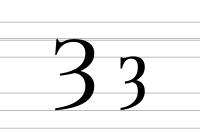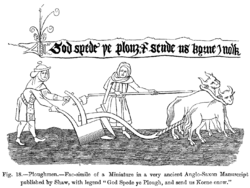Yogh facts for kids
Quick facts for kids Ȝ |
|
|---|---|
| Ȝ ȝ | |
| (See below, Typographic) | |
 |
|
| Usage | |
| Writing system | Latin script |
| Type | Alphabetic |
| Language of origin | Middle English language Latin language |
| Phonetic usage | [[[Error using : IPA symbol "g" not found in list|g]]] [j] [ŋ] [ɣ] [x] [ç] [i] [ʃ] [ʎ] [ð] [dʒ] /joʊɡ/ |
| Unicode value | U+021C, U+021D |
| History | |
| Development | |
| Time period | ~1150 to ~1500 |
| Descendants | None |
| Sisters | C G Г ג ج ܓ ࠂ ג 𐡂 Ꝿ Գ գ |
| Transliteration equivalents | ch, g, gh, j, ng, y |
| Variations | (See below, Typographic) |
| Other | |
| Other letters commonly used with | ch, gh, g, j, ng y, z |
The letter yogh (pronounced like "yok" or "yoch") was a special letter used in Middle English and Older Scots. It looked a bit like a curvy "z" or the number "3". Yogh was used to represent sounds similar to "y" (like in "yes") and other sounds like the "gh" in "night" (which used to be pronounced differently).
This letter came from an older style of the letter "g" called Insular G. Over time, especially in Middle Scots, yogh started to look so much like a handwritten "z" that printers often used "z" instead. This is why some modern Scots words and names, like the surname Menzies, have a "z" even though they were originally spelled with a yogh.
Contents
How Was Yogh Pronounced?
Yogh represented several different sounds, depending on the word and the time period.
- It could sound like the "y" in "yes" (like in the word ȝe, meaning "ye").
- It could sound like the "g" in "go" or a softer "g" sound (like the "ch" in German "Bach").
- It also stood for the "gh" sound in words like niȝt (which meant "night"). This "gh" sound was once pronounced more like the "ch" in "loch" (a Scottish lake).
- Sometimes, it even sounded like the "j" in "jump".
In Middle Scots, yogh was often used for the "y" sound, especially when it was part of a combination like "ly" or "ny". For example, lȝ might sound like "ly" in "million."
In old Cornish, yogh was used for a "th" sound, like the "th" in "this."
The History of Yogh
The story of yogh goes back a long way, showing how languages change over time.
Yogh in Old English
In Old English, the "g" sound was often written using a special symbol called the gyfu rune. Later, the Latin letter "g" was used, but it could represent different sounds. For example, the word "year" was written as gear, even though it started with a "y" sound, not a "g" sound.
As new words came into English, especially from Old Norse, there was confusion. People needed a way to tell the "g" sound (like in "go") apart from the "y" sound (like in "yes").
The special way the letter "g" was written in Insular script (an old style of writing) eventually developed into the letter yogh. It became a separate letter from "g" during the Middle English period.
Yogh in Middle English
Around the 1300s, the letters "gh" started to be used instead of yogh for sounds like the "ch" in "night." This change happened slowly. By the time printing presses arrived in England in the late 1400s, many printers didn't have the yogh character. So, "gh" became much more common.
Not all words with "gh" today originally had a yogh. For example, "spaghetti" is an Italian word, and "ghoul" comes from Arabic.
Some writers, like Orm, used yogh in different ways. He used a single yogh for the "y" sound. He doubled it for an "ee" sound, and used "ȝh" for a harder "g" sound.
By the end of the Middle English period, yogh was no longer widely used. Words like niȝt became "night." The letter "g" came back into English from French, mostly for the "g" sound we know today.
Yogh in Scots
In Early Scots, yogh was used for sounds like "ny" and "ly." For example, the "ny" sound in "canyon" or the "ly" sound in "million."
Later, in Modern Scots, the letter "z" often replaced yogh. This happened because the handwritten yogh looked very similar to a "z." This is why you see "z" in many Scottish place names and surnames today, even though they were originally spelled with yogh.
For example, the surname MacKenzie was originally pronounced more like "makenyie." The surname Menzies is still often pronounced "mingis" by some, showing its yogh origin.
After Printing Developed
When printing became common, many printers didn't have the yogh character in their sets of letters. So, they often used "z" instead. This is why some Scottish and Irish surnames that start with "Y" today, like "Yeoman," might have been spelled with a yogh in the past.
It's interesting to note that in early computer systems (Unicode 1.0), yogh was mixed up with another letter called ezh (Ʒ ʒ). Yogh finally got its own special code in Unicode version 3.0.
Examples of Middle English Words with Yogh
Here are some examples of words from Middle English that used the letter yogh:
- niȝt (meaning "night")
- yȝe (meaning "eye")
- ȝha (meaning "yea" or "yes")
- yhalȝed (meaning "hallowed" or "made holy")
- ȝhat (meaning "gate")
- ȝhe(i)d(e) (past tense of "go")
- yȝ(e/i)ld(e) (past tense of "yield")
- yherber(e)ȝed (meaning "harboured" or "sheltered")
- ȝhere (meaning "ear")
- yhyȝed (meaning "hied" or "hastened")
- ȝiefte (meaning "gift")
- ȝif (meaning "if")
- ȝise (meaning "yes")
- ȝista(i/y) (meaning "yesterday")
- ȝister- (meaning "yester-", as in "yesterday")
- ȝit(e) (meaning "yet")
- ȝive (meaning "give" or "if")
- wrouȝte (meaning "wrought" or "made")
Scots Words with "Z" Instead of Yogh
Many Scottish place names and surnames now use "z" where yogh used to be. This often means the "z" is not pronounced like a hard "z" but more like a "y" or a silent letter.
Place Names
- Ben Chonzie – a mountain in Perthshire.
- Cadzow – the old name for the town of Hamilton, South Lanarkshire.
- Cockenzie – a town in East Lothian, pronounced "cockennie."
- Culzean – a historic castle in Ayrshire, pronounced "culain."
- Drumelzier – a village in the Tweed Valley, pronounced "drumellier."
- Edzell – a village in Angus.
- Finzean – an area in Aberdeenshire, pronounced "fingen."
- Glenzier – a village in Dumfries & Galloway, pronounced "glinger."
- Kirkgunzeon – a village in Dumfries and Galloway, pronounced "kirkgunion."
- Lenzie – a village near Glasgow, once pronounced "lenyie."
- Menzion – a village in the Borders.
- Monzie – a parish in Perthshire, pronounced "money."
- Queenzieburn – a village in Lanarkshire, pronounced "queenieburn."
- Ruchazie – a district of Glasgow.
- Terringzean Castle – a castle in East Ayrshire, pronounced "tringan."
- Zell – an old spelling for the island of Yell.
- Zetland – the name for Shetland until the 1970s.
Surnames
- Dalziel – pronounced "deeyel" or "dehyell."
- McFadzean – pronounced "macfadyen."
- MacKenzie – often pronounced as written today, but originally "makenyie."
- Menzies – most correctly pronounced "mingis," though now often pronounced with a "z" sound.
- Winzet – pronounced "winyet."
Other Words
- Assoilzie – in Scots law, this means to declare someone not guilty. The "z" is silent.
- Capercailzie – the Scots spelling of capercaillie, a large bird.
- Gaberlunzie – a licensed beggar, often pronounced "gaberlunyie."
- Spulzie – in Scots law, taking movable goods illegally.
- Tailzie – an old Scots law term for an inherited estate that could not be sold.
- Tuilzie – a struggle or fight.
Yogh in Egyptology
In the study of Ancient Egyptian, a symbol similar to yogh (ꜣ) is sometimes used to represent a sound called "aleph" (
|
|
). This sound is like a soft stop in the throat. While the actual symbol is slightly different, the number "3" is sometimes used as a substitute in writing.
See also
 | Stephanie Wilson |
 | Charles Bolden |
 | Ronald McNair |
 | Frederick D. Gregory |



